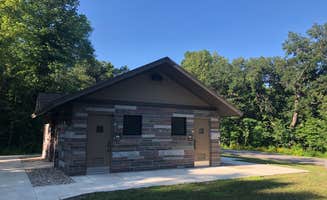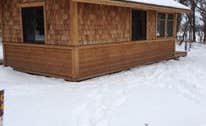Camping cabins near Mountain Lake, Minnesota provide convenient shelter options across various campgrounds in southwestern Minnesota. Situated amid rolling farmlands at approximately 1,250 feet above sea level, this region experiences warm summers with occasional thunderstorms and cold winters that bring significant snowfall. Overnight temperatures can drop substantially even in summer months, making cabins practical alternatives to tent camping.
What to do
Hiking trails: At Flandrau State Park, visitors can explore well-maintained paths through woods and prairie. "Hiking trails are marked well and are maintained," notes Tori K., who adds that while some trails are suitable for family hikes, adventurous campers can "forge your own way" off-trail for more challenging experiences.
Bison viewing: Red Fox Campground at Minneopa State Park offers a unique opportunity to see bison in their natural habitat. "Herds of ~20–40 bison grace the 330‑acre enclosure, accessible via a scenic auto‐drive," reports one visitor, who recommends viewing "from safety of your car."
Water activities: Flying Goose Campground features a lake that seems to appear out of nowhere amid farmland. "Set along the shores of Lake Imogene, which comes out of nowhere surrounded by farm land, and you can't even see it from the road," writes Chris S. The campground offers "a boat dock and a sandy swimming beach" for water recreation.
Historical exploration: Fort Ridgely State Park provides opportunities to learn about regional history. "Make sure to read up about the fort before arriving so that you can appreciate the importance of the site you're camping on," advises Tom, who notes that signage about the historical significance could use improvement.
What campers like
Sand-bottom swimming pool: Flandrau State Park features a unique swimming spot that visitors frequently mention. "The man-made swimming lake is small but clean and well maintained," writes Jen H. Another camper notes they "would like to go back in the summertime and see the giant sand bottom pool full."
Spacious sites: Sunrise Campground offers large campsites that accommodate various camping setups. "The sites in the sunrise campground were the largest we've ever setup camp on," reports Alec S. Another visitor noted their site had "a good view of the lake" and that "sites were very large for a state park."
Clean facilities: Jackson KOA maintains high cleanliness standards that campers appreciate. "Clean and updated bathrooms, nice pool and friendly staff," writes Renee W. Another visitor found the campground "clean and inviting," while others specifically mentioned the "super friendly" staff who went out of their way to help campers.
Wildlife viewing: Many campsites offer opportunities to observe local wildlife. One visitor to Fort Ridgely reported "tons of peaceful animal visitors including herds of white tail deer walking through our camp ground! Owls and coyotes singing in the distance."
What you should know
Limited privacy in some campgrounds: Several campgrounds have open layouts with minimal separation between sites. At Oak Woods Campground, "sites are well marked and they are all in close proximity to one another. There are little to no natural features that divide each site from the next. When this campground is full you have zero privacy," reports Stephanie G.
Seasonal differences: Campground availability and conditions vary significantly by season. At Jackson KOA, campers can stay "from mid-April through mid-October," while other campgrounds operate year-round but with limited services during winter.
Reservation requirements: Popular campgrounds fill quickly, especially on weekends. At Flying Goose Campground, weekends can be particularly busy due to an "on-site wedding venue" making mid-week stays better for those seeking quiet.
Bug preparation: Mosquitoes can be problematic, particularly after rainfall. One camper at Lake Shetek noted, "Mosquitoes were bad, everyone came home covered in bites," while others recommended preparing with insect repellent.
Tips for camping with families
Playground access: Sportsman Park offers multiple play areas for children. "There is lots to keep the kids busy here! A 5k paved trail that goes around the lake connecting the campground to the park on the other side of the lake, bike rentals (using an app on your phone), the lake to fish/kayak/boat, a beach on the opposite side of the lake, playgrounds (small one in campground, medium on next to lake, and large one on other side of lake if you follow the paved trail)," writes Allysa K.
Creek exploration: Some campgrounds offer creek access that children particularly enjoy. At Fort Ridgely, sites feature "a nice little creek about 50 ft behind our site, that our boys loved playing in," reports Cody T.
Free amenities: Several parks offer additional free activities that enhance family experiences. At Sportsman Park, visitors can access "bike rentals (using an app on your phone)" and even a "little Library" for reading materials.
Cabin considerations: For families, cabin size matters significantly. While many cabins feature bunk beds, space constraints can become an issue with longer stays or larger groups. Some cabins include electric service while others are more rustic.
Tips from RVers
Site selection: At Plum Creek Park Campground, "the daily sites are 30 and 50 electric only" with a "fresh water fill spigot on the bathroom closest to the daily sites" and an on-site dump station, according to Scott K.
Seasonal sites: Many campgrounds have a high percentage of seasonal occupants. At Flying Goose, "~70% of the spots are taken by seasonal guests who are primarily at the campgrounds on the weekends," creating a quiet mid-week atmosphere.
Connectivity: Internet access varies between campgrounds. Plum Creek offers WiFi though it's "a bit on the slow size and is paid for extra but better than nothing," while cell service can be limited or non-existent at some parks.
Hookup configuration: Site layout for utilities can affect comfort. At Flying Goose, one visitor noted their site "was not set up well for the connections however it was a large site," suggesting RVers should request specific information about hookup placement when reserving.




